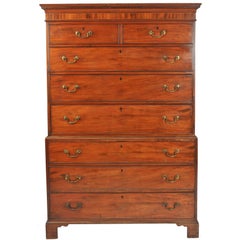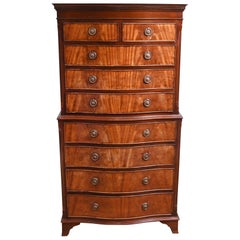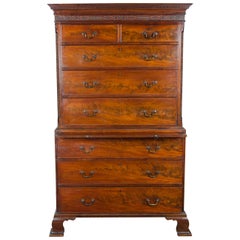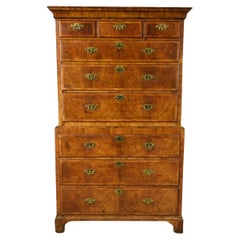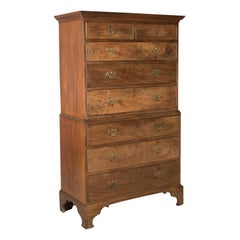Georgian Tall Boy
Antique Early 1800s English Georgian Commodes and Chests of Drawers
Mahogany
Antique Early 1800s Georgian Commodes and Chests of Drawers
Mahogany
Antique Late 18th Century English Chippendale Commodes and Chests of Dra...
Mahogany
Recent Sales
Antique 1720s English Queen Anne Commodes and Chests of Drawers
Walnut
Antique Late 18th Century English Georgian Commodes and Chests of Drawers
Mahogany
Antique Mid-18th Century British Georgian Commodes and Chests of Drawers
Oak
Antique 17th Century English George II Commodes and Chests of Drawers
Walnut
Antique 1720s English Georgian Dressers
Walnut
Antique Early 1900s English George III Commodes and Chests of Drawers
Walnut
Antique Early 1900s English Georgian Commodes and Chests of Drawers
Walnut
Antique Early 1900s English Georgian Commodes and Chests of Drawers
Walnut
Antique Early 1900s English Georgian Commodes and Chests of Drawers
Walnut
Antique Mid-19th Century English Georgian Commodes and Chests of Drawers
Mahogany
Antique Early 19th Century British Georgian Commodes and Chests of Drawers
Pine
People Also Browsed
Antique Late 18th Century English George III Commodes and Chests of Drawers
Brass
Antique Late 18th Century Georgian Commodes and Chests of Drawers
Mahogany
Mid-20th Century American Hepplewhite Commodes and Chests of Drawers
Brass
Antique Early 19th Century English George III Commodes and Chests of Dra...
Mahogany
Antique Early 19th Century British Georgian Commodes and Chests of Drawers
Mahogany, Oak
Antique Mid-18th Century English George III Commodes and Chests of Drawers
Wood, Mahogany
20th Century Georgian Commodes and Chests of Drawers
Metal
Antique 1790s English Chippendale Commodes and Chests of Drawers
Brass
Antique 1760s English Georgian Commodes and Chests of Drawers
Mahogany
Antique Mid-18th Century English George III Commodes and Chests of Drawers
Wood
Antique Early 19th Century English George III Commodes and Chests of Dra...
Mahogany
Antique Late 18th Century English Georgian Commodes and Chests of Drawers
Brass
Antique 1790s English Chippendale Commodes and Chests of Drawers
Brass
Antique Mid-18th Century English George III Commodes and Chests of Drawers
Mahogany
Antique 19th Century Commodes and Chests of Drawers
Mahogany
Antique Early 18th Century English George I Commodes and Chests of Drawers
Walnut
Finding the Right Commodes-chests-of-drawers for You
Shopping for a commode or a chest of drawers?
Commode is the French term for a low chest of drawers, but it is also sometimes used to denote any case piece with a particularly intricate design. The commode dates to circa 1700 France, where it was used as an alternative to a taller cabinet piece so as to not obscure paneled, mirrored or tapestried walls. Coffers, or chests, which were large wooden boxes with hinged lids and sometimes stood on ball feet, preceded chests of drawers, a fashionable cabinet furnishing that garnered acclaim for its obvious storage potential and versatility. The term commode was also used to refer to a piece of bedroom furniture — a washstand or nightstand that contained a chamber pot.
As time passed, French and British furniture makers led the way in the production of chests of drawers, and features like the integration of bronze and ornamental pulls became commonplace. Antique French commodes in the Louis XV style were sometimes crafted in mahogany or walnut, while an Italian marble top added a sophisticated decorative flourish. This specific type of case piece grew in popularity in the years that followed.
So, what makes a chest of drawers different from a common dresser? Dressers are short, and chests of drawers are overall taller pieces of furniture that typically do not have room on the top for a mirror as most dressers do. Tallboys and highboys are variations of the dresser form. Some chests of drawers have one column of four to six long drawers or three long drawers in their bottom section that are topped by a cluster of small side-by-side drawers on the top. To further complicate things, we sometimes refer to particularly short chests of drawers as nightstands.
Even though chests of drawers are commonly thought of as bedroom furniture to store clothing, these are adaptable pieces. A chest of drawers can house important documents — think of your walnut Art Deco commode as an upgrade to your filing cabinet. Nestle your chest near your home’s front door to store coats and other outerwear, while the top can be a place to drop your handbag. Add some flair to your kitchen, where this lovable case piece can hold pots, pans and even cookbooks.
When shopping for the right chest of drawers for your home, there are a few key things to consider: What will you be storing in it? How big a chest will you need?
Speaking of size, don’t dream too big. If your space is on the smaller side, a more streamlined vintage mid-century modern chest of drawers, perhaps one designed by Paul McCobb or T.H. Robsjohn-Gibbings, may best suit your needs.
At 1stDibs, we make it easy to add style and storage to your home. Browse our collection of antique and vintage commodes and chests of drawers today.
- What is a tall boy?1 Answer1stDibs ExpertFebruary 22, 2021A tall boy is a piece of furniture that features a wardrobe on top. A tall boy should not be confused with a highboy which is a tall chest of drawers.
